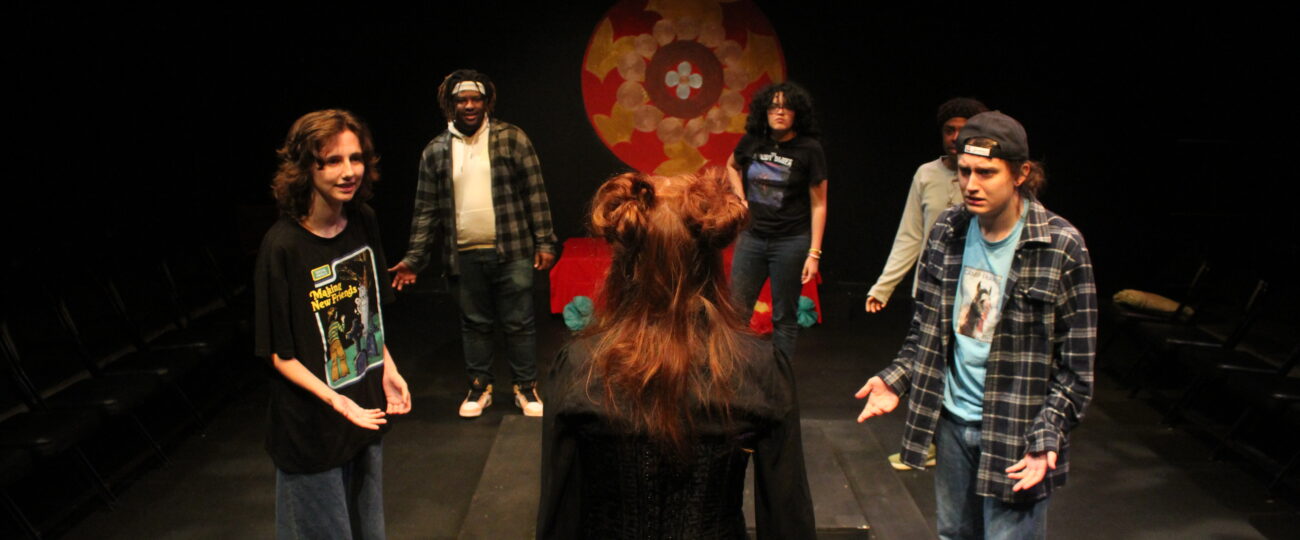Death, God, Understanding and Time united in Johnson Studio Theatre on Thursday night for the theatre department’s first show of the semester. The lively atmosphere contrasted sharply with the somber melodies resonating throughout the small room. As though at a funeral, memorial slideshows flashed over the screen, representing the actors’ humorous deaths.
The play “Everybody,” created by Branden Jacobs-Jenkin, was inspired by the 15th-century morality play “Everyman.” In the story, God wants Everybody to present their life and choices to God so that God can understand why the human experience has been so problematic. Terrified of dying alone, Everybody is determined to find somebody to accompany them.
The play was performed in a small, enclosed theatre, and director Eden Cook describes how she enjoyed the intimate setting, “Breaking the fourth wall and forcing the audience to be a part of the show is what makes my job so fun. I couldn’t imagine doing this show in any other space,” she said.
From Wednesday until Sunday, a new actor donned the role of Everybody through a lottery system, which resulted in a new casting with each performance. This unique take on casting presented a unique challenge to Winthrop’s young actors.
Francis Judge, a sophomore theatre major, played one of the Somebody’s in Thursday night’s performance and examined his time preparing for the role.
“Typically, an actor would spend time doing character work for a singular character, but for Everybody, five actors had to memorize lines for 11 different characters. It was a ton of work, but everyone rose to the challenge and made it a reality in only a month,” he said.
While shifting characters every night posed a challenge, it also created a unique performance when a new actor took the stage as Everybody. Judge said, “Every actor playing Everybody has their interpretation of the character, largely based on their own experiences and beliefs.”
Courtney Clark, a junior theatre education major, took on the daunting task of playing Death, one of the fixed roles in the play. Death, as their name suggests, was a dark and angry character. Clark noted the difficulties she experienced when playing a role unlike any other she had played before.
“This was certainly a role outside of my comfort zone. Death’s personality, actions and mannerisms are very different from mine. I think that if given the chance, more actors should step out of their comfort zones and directors should look for that wild card,” she said.
The play explores themes of diversity, love and a journey that all humans embark on. It is about delving into the past and discovering more about ourselves. It’s about the harsh reality that everyone else is on a similar path.
Judge explored the deeper meaning of the play and said, “As Everybody, you had to understand why this character is begging their loved ones to come with them to the afterlife, and as the other characters, you had to understand why that’s something you can not ask of people.”
In the last few scenes, the audience watched as Love and Evil dragged Everybody off the stage, signifying their death. Chosen at random, Everybody experiences a phenomenon that all humans will one day encounter: dying.
Judge said, “We are all technically alone with ourselves, but our love is a part of us. Love is what we take with us when we die, along with the bad things we do, but this show serves as a reminder to love more than you hate.”
“Everybody” sold out multiple shows, and was the first production cast through a lottery system performed in the theater.
“This is a historic show for the Studio Theatre and I’m forever grateful for the opportunity to have been chosen to direct this play and to have had the amount of support I’ve had during the showing of this production,” Cook said.




